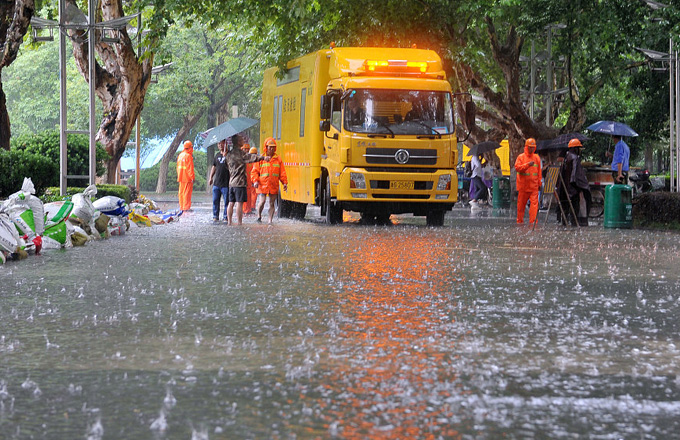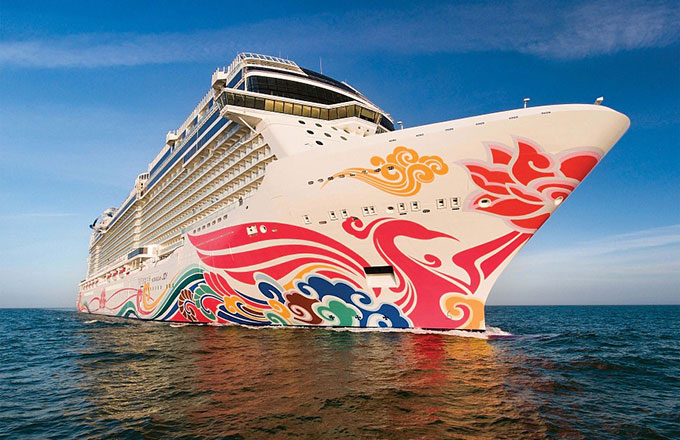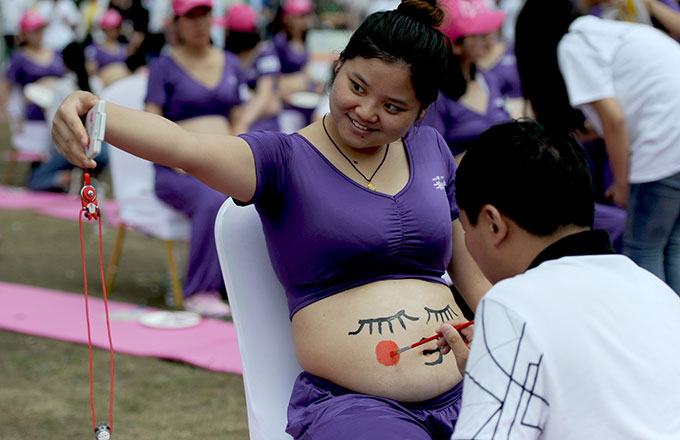From the crossing of the Yangtze to the capture of Shanghai
August 4, 1949
Having just come to Beiping from Shanghai, I should like to report to you on how the Second and Third Field Armies of our People's Liberation Army crossed the Yangtze River and captured Shanghai and what they have done there since.
The campaign to cross the river was launched on the night of April 20. Due to the fact that the reactionary Nanjing government had rejected the people's eight peace terms, part of the People's Liberation Army, namely, the Second Field Army, under the command of Comrade Liu Bocheng, and the Third Field Army, under the command of Comrade Chen Yi, were ordered to fight across the river. All our troops successfully crossed the Yangtze along the long battle line of more than 500 kilometers. Before launching the battle, we gave the reactionary Nanjing government one last chance to reconsider. When they rejected the people's generous terms for peace, we had to teach them another lesson by dealing them one more blow. It could be said that we met with little resistance during the battle to cross the river. Along the battle line, extending 500 kilometers from Hukou to Shanghai, 450,000 Kuomintang troops were deployed there (700,000 if those stationed along the Yichang-Hukou sector are included), which failed to prevent the People's Liberation Army from crossing the river. We did not encounter fierce resistance anywhere. We made a wide, frontal crossing from scores of places, meeting with no substantial resistance in most places. Should anyone ask, "How long did it take to cross the river?" we have a definite reply: a quarter of an hour for the fastest advance boats. Beginning on the night of April 20, nearly all the 300,000 men crossed the river in a twenty-four hour period, plunging the enemy troops into chaos. With just one thought on their minds--breaking out of the encirclement--they fled southward helter-skelter. The People's Liberation Army immediately took up pursuit, launching a wide frontal attack, until it took Nanjing in the process, on April 23. By early May our troops had completed their pursuit, which lasted two weeks. They had advanced 750 kilometers from where they crossed the Yangtze, to northern Fujian and northeastern Jiangxi. The reason our officers and men could accomplish this striking feat--travelling such a long distance in such a short time despite skirmishes and rain--lay in their bravery in the face of personal danger. Previously, their bravery had been manifested on the battlefield; this time it was manifested mainly through their feet. This kind of pursuit made it impossible for the enemy to reorganize his troops. After our first echelon was 250 or 300 kilometers ahead, the second and third echelons still had to wipe out enemy troops left behind. In early May our troops completed their pursuit, occupying Hangzhou, Wenzhou, Fenghua (Chiang Kai-shek's hometown) and Ningbo, and advancing all the way down to northern Fujian and northeastern Jiangxi. After that, they prepared to attack Shanghai, where there were 200,000 enemy troops under the personal command of Chiang Kai-shek. After a week-long battle, we captured Shanghai on May 27. The entire operation was named the "Nanjing-Shanghai-Hangzhou Campaign" by the Central Committee. From the crossing of the Yangtze to the capture of Shanghai, it took one month and seven days, during which we wiped out more than 400,000 enemy troops. Of the 25,000 casualties among our troops, 17,000 were wounded or killed when trying to take Shanghai, and the rest during bombing by enemy planes while crossing the Yangtze. One of our armies captured 60,000 enemy troops at the cost of 1,100 of its own men, a small loss in comparison with that of the enemy.
Why were we able to cross the Yangtze and swiftly complete the Nanjing-Shanghai-Hangzhou Campaign using only half the time we expected? In addition to the correct leadership of the Chinese People's Revolutionary Military Commission and Chairman Mao Zedong, the reasons are as follows:
First, we made adequate military preparations and our officers and men were brave. Before we crossed the river, the Chiang Kai-shek clique mistook the leniency we extended them for weakness on the part of the people, and believed that the river, a natural barrier, could not be breached, staking their lot on it. The People's Liberation Army soldiers, however, were confident of victory, basing their confidence not only on their political faith but also on the practical preparations they had made. For example, we needed boats to cross the river, but the boats had all been towed to the south bank of the river by the Kuomintang. Our boats were berthed on the lakes and rivers north of the Yangtze (each boat could carry eight to twelve persons; larger one, fifty, and the largest, one hundred), but the mouths of these rivers were blockaded by the enemy, making it impossible for us to paddle our boats into the Yangtze. Some so-called strategists thought this difficulty insurmountable, yet we overcame it. When we began to cross the river, the enemy wondered where our boats could have come from. Actually, we took our boats to the river overland instead of by water, digging ditches through which we pulled our boats to the river. Sometimes we had to dig ditches many kilometers long, the longest being 30 kilometers. We put 21 million man-days digging ditches and pulling down dams. It took several hundred thousand officers and men, including divisional and regimental commanders, plus the same number of laborers, six weeks to complete that enormous project. We had about ten thousand boats on hand, enabling our one million soldiers to cross the river. In addition, most of our troops were northerners, who are unaccustomed to water. It was just because of this that Cao Cao was defeated. In order for our troops to avoid becoming seasick and to be prepared for all circumstances, we performed maneuvers north of Chaohu Lake day and night. After becoming accustomed to the boats, we began to think about being shot at on the river. Many soldiers got the idea of making life preservers out of straw, because the rubber ones would deflate if short. In fact, we did not use them when crossing the river, so this preparation was "wasted". Finally, we practiced on inland rivers, in the belief that the Yangtze River was no more turbulent than the Yellow River. In short, our confidence was built on practical military preparations, not to speak of our political faith. From practical experience we learned that the Yangtze River was not too difficult to cross.
Second, we had the support of the masses and the co-operation of underground Party members and guerrilla fighters. We had worked only in some of the guerrilla areas, yet all the people supported us, digging half the ditches, for example. While preparing to cross the river, with our main force assembled in the area between Wuhu and Anqing, we needed 75,000 tons of grain, of which 80 per cent came from the people along the river. They gave us every bit of grain they could spare, saying it did not matter if they suffered from hunger so long as they could help us cross the river. To help us solve the problem of firewood, people even pulled down their houses without hesitation and gave us the wood. The people also undertook other arduous tasks for the campaign, including repairing roads, transporting grain and serving as boatmen. Half the boatmen came from the people; the other half were soldiers specially trained for the purpose. Underground Party members and guerrilla fighters south of the Yangtze also helped us in the battle. For example, one of our army units crossed the river and hid for ten days without the enemy knowing.
Third, we were faced with a weak enemy. We overestimated the enemy in the beginning. The resistance he offered was feeble, as could be seen when we pursued him after crossing the river. Thus we were able to complete swiftly the Nanjing-Shanghai-Hangzhou Campaign.
Without doubt, the battle to cross the river was crowned with great victory, marking the downfall of the enemy's largest and best organized force south of the Yangtze River. After the Liaoxi-Shenyang Campaign in northeast China, the Huai-Hai Campaign in east China,107 and the Beiping-Tianjin Campaign in north China, the Kuomintang reactionaries stationed the largest and best-organized of their remaining forces along the battle line south of the Yangtze. In the battle to cross the river we wiped out over 400,000 of their troops, which means the Kuomintang can no longer put up any effective resistance. Politically, our victory spells the end of the reactionary Nanjing government. It also means that the People's Liberation Army will not come up against any fierce military resistance in the future and that it will not be long before the PLA wipes out the remaining enemy troops and liberate the whole of China.
After occupying the cities militarily, we began, one by one, to take total control of them. From the day we started to cross the river to the day I left Shanghai, a period of about 3 months, the takeover was, by and large, complete and, generally speaking, things went fairly well.
First, this was because the Central Committee had formulated a series of explicit policies for the personnel in charge of the takeover of cities to follow. In addition, the experience we gained in liberating Changchun, Shenyang, Beiping, Tianjin, Jinan, Weifang, Shijiazhuang, Zhengzhou, Kaifeng and Xuzhou greatly facilitated our efforts to liberate areas south of the Yangtze, with the result that we avoided many detours.
Second, it was because people from all walks of life supported us. After crossing the river, we noticed that people were extremely displeased with the reactionary Kuomintang rule and warmly applauded the policies of the Communist Party. Workers and students, in particular, expressed tremendous enthusiasm for the revolution. If it had not been for their great fervor and enthusiasm, we would have encountered even more difficulties. Besides the workers and students, people from industrial, commercial, cultural and scientific circles also co-operated with us. For example, people from these circles in Nanjing volunteered to help us take over Shanghai and joined our army.
Third, because it was dictated by the general trend of events--everybody had noticed that there was not hope of propping up the reactionary Kuomintang rule again and even those who had cherished illusions about the Kuomintang began to reconsider their positions. Everybody had come to realize that the people's victory was a foregone conclusion. Although Chiang Kai-shek can still boast of Taiwan and the 200 million people under his control, the Kuomintang's 400,000 troops are gone and its military structure has been thrown into confusion. This is the general situation. Many people were compelled to reconsider their positions, as was demonstrated by the fact that the overwhelming majority of the employees in Kuomintang institutions remained there. As a result, their offices, colleges and scientific institutions were in fairly good repair, and many of them had done a great deal to protect these institutions even before we crossed the river, making the takeover much easier. This happened practically in every city. Under this general situation, in which people support us and oppose them, the imperialists and reactionaries have to yield to the mighty strength of the people. There is no alternative for Leighton Stuart either; he dares not treat the people's government as he did the Kuomintang, nor does he dare treat the people of our liberated areas as he did the people under Kuomintang rule. He may have something evil secretly planned, but he has to conceal his malicious feelings.
Fourth, because we worked hard. As I mentioned earlier, we prepared ourselves both politically and organizationally for the takeover to be executed after crossing the river. We transferred over 20,000 cadres from east China, who had received some education in policy. On entering a new area, they followed the policy known as the "four contradictions involving eight side", as formulated by Chairman Mao, and contacted and held many meetings with people from all walks of life. Although their work may leave something to be desired (this was especially true under the complex circumstances in Shanghai), they have made every effort to co-operate with people from all sections of society in conformity with this policy. In Shanghai, Comrade Chen Yi attended one or even two meetings every day to explain our position and policies, calling on the people to co-operate with us. Their attitude and activities have won us even more support from all quarters, contributing to the success of the takeover.
(First part of a report delivered to delegates of the Preparatory Committee of the New Political Consultative Conference.)
(From Selected Works of Deng Xiaoping, Volume I <1938-1965>)
- China issues guidelines to develop 'all-for-one' tourism demonstration zones
- Torrential rain triggers disaster in Southwest China
- Harvest time for wheat reapers in Shanxi
- Over 200 couples marry in Changchun group wedding
- Calligraphy tops other icons of Chinese culture, WeChat data shows

























